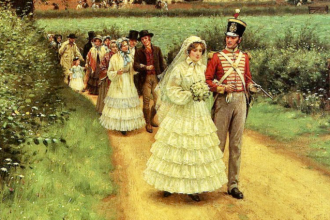Br. Aquinas Beale
For Jane Austen’s heroines, marriage is the end towards which their virtuous lives are directed.
Above all other blessings Oh! God, for ourselves, and our fellow-creatures, we implore Thee to quicken our sense of thy Mercy in the redemption of the World, of the Value of that Holy Religion in which we have been brought up, that we may not by our own neglect, throw away the salvation thou hast given us, nor be Christians only in name. —Jane Austen’s Prayers
One of the characteristic aspects of all of Austen’s novels is that they end in happy marriages for the heroines. Several modern literary critics have wondered at the motivation behind this feature of her novels, given that Austen herself never married. Is it the case that she was vicariously living through her characters? Was she simply giving the readers what she knew they wanted? Or is there perhaps something more profound motivating her use of the marriage construct? Some critics have speculated as much. For example, one can find traces of a critique of the French Revolution in Pride and Prejudice, complete with an “English” solution: a marriage between the middle and upper classes.
Here, I would like to offer quite a different allegorical interpretation of the marriage plot as used by Austen. It is easy to consider the marriages simply as the reward for the virtuous efforts of her heroines, especially considering that each one is brought about through a Deus ex machina. They all have struggled through the challenges of life and have come out on the other side as women possessing and growing in virtue. From this perspective, then, marriage is the end towards which the virtuous lives of her heroines are directed. Turning Henry Crawford’s allusion to Milton on its head, for Austen’s heroines, marriage is heaven’s last best gift. » Read More
https://theimaginativeconservative.org/2024/12/heaven-last-best-gift-marriage-aquinas-beale.html
Marriage: The Last, Best Gift of Heaven
Tags:
Img Conservative

https://theimaginativeconservative.org/




